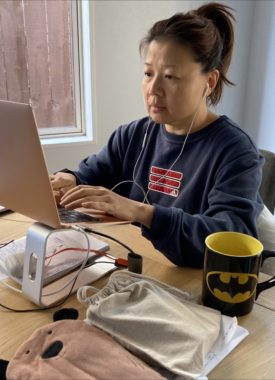I Share My Experience to Foster Compassion in the Rare Disease World

I count myself very fortunate to be in a position where I can speak to readers. Every week I sit at my desk, and in the stillness of the day, while the household is silent, I reflect back on my week or my life in general and compose my thoughts.
This opportunity is only possible because the company I write for strongly believes in providing a voice and platform to both rare disease patients and their carers.
My husband was diagnosed with hereditary ATTR amyloidosis in 2013. If you have read my columns, you know how challenging it has been for both of us. So having this outlet to share both joy and grief is very precious to me.
Thank you, Bionews, for providing this portal of communication for us. It is especially valuable because the rare disease community has often been shrouded in obscurity. For years, many sufferers have had to simply accept their conditions and circumstances. Too often their voices are silenced and their petitions invalidated.
I do not want to prosecute people who are apathetic toward individuals with rare conditions. In an article for Psychology Today, psychologist Leon Seltzer, PhD, describes apathy as not only a feeling but an attitude. It is a lack of desire to engage in any meaningful action, simply because there is no personal gain. Many people are not motivated to learn about or support causes that don’t benefit or affect them personally.
However, we need to shift this outlook and foster more compassion and concern because rare conditions are actually more common than people assume. An estimated 25 to 30 million people live with a rare disease in the United States. An analysis published in the European Journal of Human Genetics indicates that up to 446 million people worldwide are affected by a rare disease at any point in time.
I believe the first step I can take as a carer to a spouse with hATTR amyloidosis is to share my experience and hopefully plant seeds of understanding and appreciation of what it is like to live with a spouse who has a rare disease. I want to champion hope so that when the next person on the street sees us, they do not walk away with an apathetic attitude but instead feel compelled to help.
In thinking about my writing, I reflect on the words of Henry Lee, a cavalry officer during the American Revolution, set forth in a letter to U.S. Founding Father Thomas Jefferson: “This was the object of the Declaration of Independence. Not to find out new principles, or new arguments, never before thought of, not merely to say things which had never been said before; but to place before mankind the common sense of the subject, in terms so plain and firm as to command their assent, and to justify ourselves in the independent stand we are compelled to take. ”

Jaime works at her writing station. (Photo by Joelle Christmas)
***
Note: FAP News Today is strictly a news and information website about the disease. It does not provide medical advice, diagnosis, or treatment. This content is not intended to be a substitute for professional medical advice, diagnosis, or treatment. Always seek the advice of your physician or other qualified health provider with any questions you may have regarding a medical condition. Never disregard professional medical advice or delay in seeking it because of something you have read on this website. The opinions expressed in this column are not those of FAP News Today or its parent company, Bionews, and are intended to spark discussion about issues pertaining to familial amyloid polyneuropathy.







Leave a comment
Fill in the required fields to post. Your email address will not be published.